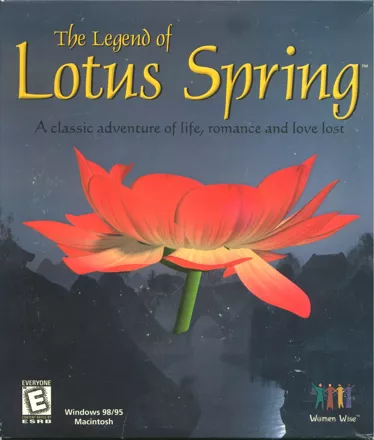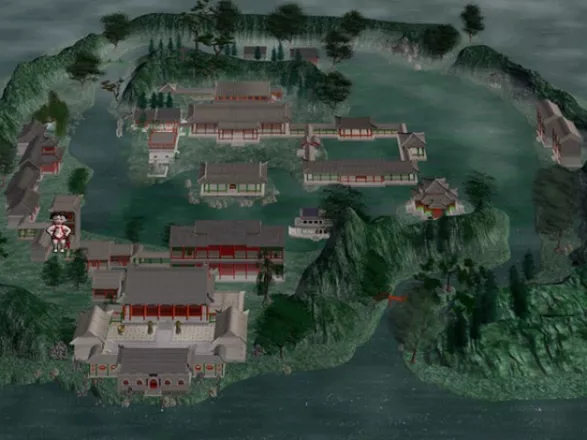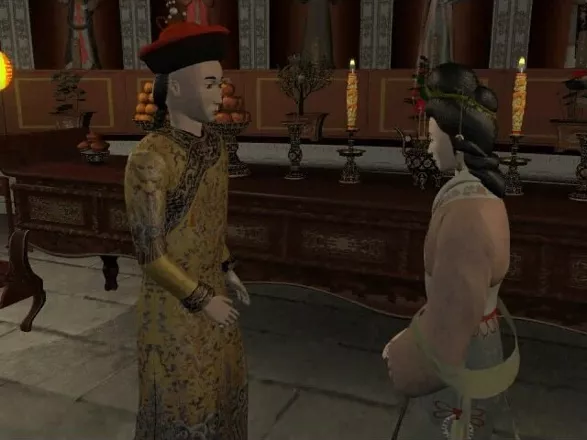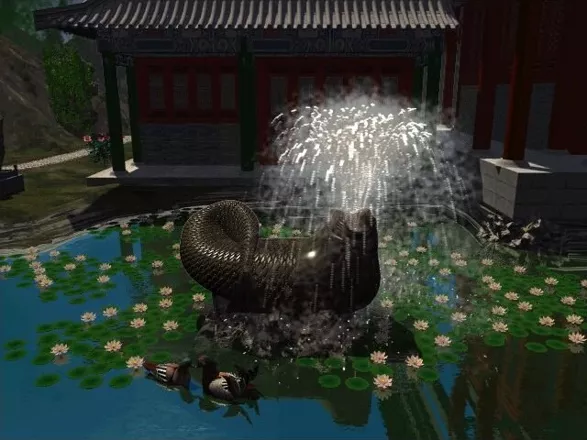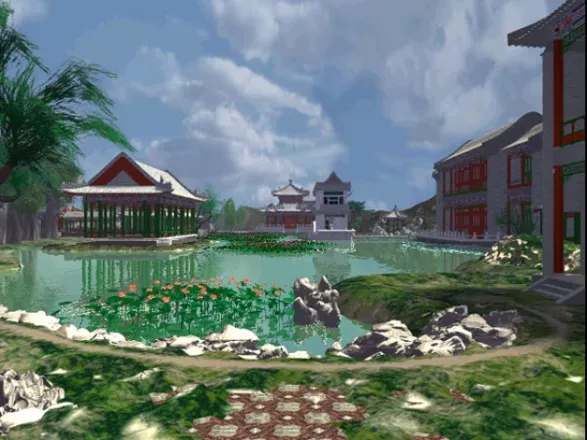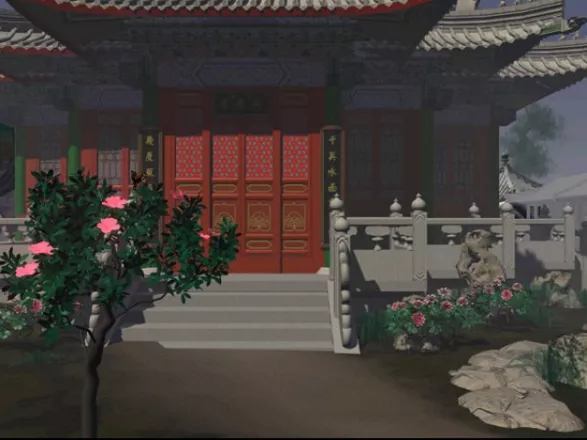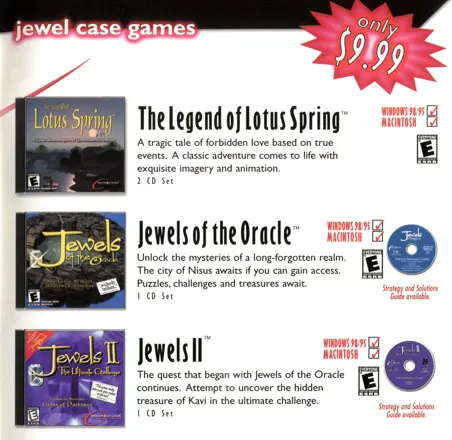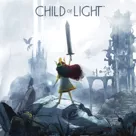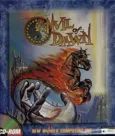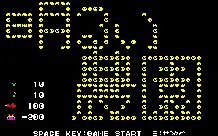The Legend of Lotus Spring
Description official descriptions
This game brings to life a 19th century Chinese love story between an emperor and his mistress. You play in first person through the eyes of Xian Feng, emperor of the Manshu dynasty Qing, as he recalls memories of his time with his lovely concubine, He Han Qu, whom he affectionately named Lotus Spring.
Explore one of China's most historic and beautiful locations, Yuan Ming Yuan (the Garden of Perfect Brightness), where Lotus Spring spent her life after being banished to that place by the jealous Dowager Empress CiXi, the emperor's first wife.
Wander leisurely through lush Chinese gardens, flower-bordered pathways and authentically recreated buildings as the bittersweet story unfolds. You'll learn about the culture and traditions of China as a natural part of the storytelling. As objects are examined, collected and used you'll unlock Feng's memories of his relationship with Lotus Spring one by one.
The game employs still graphic backgrounds with QuickTime technology for motion and video cut-scenes.
Spellings
- 梦回圆明园:寻幽濂溪乐处 - Simplified Chinese spelling
- 荷花仙子:圓明園之濂溪樂處 - Traditional Chinese spelling
Groups +
Screenshots
Promos
Credits (Windows version)
18 People (15 developers, 3 thanks) · View all
| Producer | |
| Design | |
| Story | |
| Art Direction | |
| Digital Art | |
| Programming | |
| Music | |
| Recording | |
| Jewel Case and Booklet Design | |
| Voice Talent | |
| Vocalist | |
| Story Introduction and Closing Theme Written by | |
| Novella by | |
| Vocal Sound Engineering | |
| Music Arrangement Closing Segment | |
| Talent Casting and Direction | |
| For Women Wise | |
| Special Thanks To |
|
| [ full credits ] | |
Reviews
Critics
Average score: 56% (based on 7 ratings)
Players
Average score: 2.7 out of 5 (based on 5 ratings with 2 reviews)
Surely a Chinese love story could be more playable...
The Good
The Chinese developers did a good job with the game's visuals. The graphics are detailed, and the animated sequences are quite impressive. Some of the animations are pretty long, particularly the final one, which is also rewarding from the point of view of the narrative. The music is also appropriately Chinese and absolutely authentic. Attention to detail in object design clearly shows how much the developers were interested in getting the player acquainted with the Chinese culture. Enter every room and you will see veritable pieces of art - well, in fact, the whole game is something like a tour around the garden.
Although the beauty of the game world owes a lot to the actual beauty of the original garden, the quality of the art is still high - objects don't feel "dead", many of them are animated, can be interacted with, taken apart. The graphical style is not too photorealistic, with a bit of hand-painted feeling to it. Check out for example the numerous animals that appear in the game. They are well-animated and nicely integrated into the backgrounds.
I wouldn't necessarily count that as a plus, but the game follows the Chinese aesthetics rather faithfully. Traditional Chinese art values style and beauty more than inner dynamics and content. A great poem is a work that is technically immaculate, but that only insinuates in a beautiful form at something, without saying it directly. A great picture doesn't attempt to reflect reality; it only transmits a certain impression. Great music doesn't stir emotions, it calms them. While this is not at all the way I view art, it is interesting how this game tries to reflect this kind of aesthetics.
Besides the main love story, the game also recounts many other classic Chinese love stories, which serve as a decoration to the tale of Lotus Spring. You are free not to read the diary at all, ignore the "secondary" love stories and all the information about objects. But a lot of this stuff is actually more interesting than the main story itself. Every location has an "information screen" attached to it: by accessing it, you can read about the important objects located in the rooms. In case you are bored with this "tour", you can neglect all those descriptions and concentrate fully on the love story. In every room a short movie awaits you - Xian Feng's memories, awakened by this interesting world of inanimate objects he had shared with his beloved one.
Surprisingly enough, there are quite a few things to interact with, considering the limited possibilities of the game's engine. Besides the places where you must pick and use the six objects that are needed to complete the story, all other locations are not obligatory - you can visit or ignore them if you want. Of course, there is no way to know which location holds an important object, so you'll probably end up exploring every corner of the garden, but you still have the feeling of exploring on your own instead of being lead by someone.
The Bad
Although the developers gave a lot of thought to the visuals, they failed to do the same with the interface, which is the same old "picture-jumping" kind of thing we all know (and not necessarily like) from Myst. Your only means of doing anything in the game is the admittedly cute, but extremely uncomfortable doll-like cursor. If the game decides you should be able to do something, it becomes animated when you move it over the correspondent spot. If you can't, it stands still. In order to take two steps forward you have to click two times, "jumping" forward awkwardly, although you already see the destination point. And sometimes you have to click even four or five times, because the game often refuses to make a normal path for you, instead forcing you to walk like a drunkard, swinging from left to right. You might see a table with an intriguing musical instrument on it right in front of you, but are forced to perform acrobatic maneuvers to access it from behind, climbing on the bed, rolling your eyes to the ceiling to catch a glimpse of a traditional Chinese deity, and sticking your nose into a bowl of fish food, before positioning yourself in front of musical instrument and happily discovering the damn doll is now willing to play it for you. This is so ridiculous that it is not funny any more, it is simply aggravating.
Sometimes the animated sequences are slightly pixelated, and the graphics are technically not so great - object design is excellent, but outdoor areas are not very impressive, to say the least. The two characters who appear in the game (while the box cover speaks about "encountering fascinating characters", you don't encounter anyone but a ghostly apparition of Lotus Spring in the game - or maybe they thought turtles and fish were fascinating characters?) are nicely designed, but very awkwardly animated. There is generally no real movement in the game except a few animated animals and cutscenes - when you make a step, you just jump to another picture. You can't rotate the camera, can't look up, down, or to the sides.
These flaws could have been overlooked if Legend of Lotus Spring offered a solid gameplay system. Sadly, the gameplay here is almost non-existent. For once, the game offers absolutely no challenge. If you can get used to the awkward interface, you will be able to finish it in a couple of hours, even if you've never played an adventure game before. There are almost no actual tasks to accomplish, and no skill needed to do whatever little the game might demand from you. There are no puzzles, no dialogue trees, no activities at all besides walking around and looking at things.
The absence of puzzles means that the entire game is composed of aimless and restricted wandering around. The playing area itself is in fact very small; even if the game did have puzzles, you'd have no trouble at all locating them and probably solving them by trial-and-error only because there aren't many places to try things in anyway. For a while you can be entertained with the educational material, but very soon you begin to crave for gameplay. Alas, this moment never comes: the whole game feels like a pretty demo of a famous historical location rather than a real adventure.
The Bottom Line
Legend of Lotus Spring is a short slideshow with next to no gameplay value. I think it had potential with its exotic visuals and plot concept; but you can't make a game out of a simple tour if you don't offer any challenges that would truly connect you to it on an interactive level.
Windows · by Unicorn Lynx (181775) · 2014
A unique, bittersweet Chinese love story
The Good
The Legend of Lotus Spring is a romantic tale of lost love, based on the true story of a Chinese Emperor and his beautiful concubine. Because of its non-violent nature, its bittersweet story, and the amount of historical content, Lotus Spring can be played and enjoyed by the entire family.
The story takes place in 19th-century China, in the Garden of Perfect Brightness outside the city of Bejing. Emperor Xian Feng of the Qing Dynasty falls in love with HeHanQu, whom he affectionately calls Lotus Spring. When he hears rumors that she has disappeared, Xian Feng travels to the Garden to find out if the rumors are true. You then lead Xian Feng through elaborately decorated buildings and gardens, listening to oriental music and recalling the joyous life he and Lotus Spring spent together. Picking up the special objects left behind by Lotus Spring, you trigger his memories of the happiness they shared and the events which lead to her disappearance.
The game installs almost nothing onto your hard drive and runs off of its 2 CDs. The only time you have to switch CDs is when you first load the game. The number of saves is limited only by your hard disk space and that action is accomplished easily. The manual is well written and provides a good background history on China and the customs that relate to the time the game takes place.
The musical score adds just the right amount of atmosphere to the game, although it was somewhat repetitive at times. The sound effects are not extraordinary: the squeak of a door opening or closing, the sound of running water, and an animal or two.
The graphics are exquisitely beautiful and appear to represent ancient China very well.
The Bad
The Legend of Lotus Spring is more of an animated interactive movie than a game. There are virtually no puzzles in the traditional sense. Cut-scenes in the form of dreams and memories appear when you activate a special item or location. Although those scenes are nicely done, the player must read the narrative that is available after each scene in order to understand its background and relation to the story. Not all of the cut-scenes are necessary, meaning that a player could finish the game without reading the whole story.
Your movement as the player is limited to specific directions, as indicated by a cute little China Doll cursor.
The game is very linear. In fact, at one important section, if you do something in the wrong order, the game will crash.
The Bottom Line
A short but sweet tale playable by all ages, with beautiful scenery and Oriental music. Most players will be able to complete it over a weekend. The story is unique and can be heart-tugging at times but a lack of puzzles and ease of play make it unchallenging.
Windows · by Jeanne (75944) · 2001
Trivia
Protagonist
Emperor Xian Feng of the Manshu dynasty Qing was a real person. That dynasty conquered China in 1644 and reigned there until the revolution of 1911.
In fact, Yuan Ming Yuan, or the Garden of Perfect Brightness, was destroyed by fire just two years after this story takes place, during the second Opium Wars. After it was set on fire, it burned for three days and three nights.
Analytics
Upgrade to MobyPro to view research rankings!
Related Sites +
-
Legend of Lotus Spring
Xing-Xing official web site -
Lotus Spring Hints
Helpful hints for solving The Legend of Lotus Spring -
Roadmap to Lotus Spring
Step by step walkthrough for the Legend of Lotus Spring with actual scenes from the game. Navigate to each area by clicking on the numbers from the beginning map. -
UHSWeb Review
Legend of Lotus Spring Review on UHSWeb -
Women-Wise - Games Women Play
Official publisher page -
Zarf's Review
A Macintosh review of The Legend of Lotus Spring by Andrew Plotkin (February, 2000).
Identifiers +
Contribute
Are you familiar with this game? Help document and preserve this entry in video game history! If your contribution is approved, you will earn points and be credited as a contributor.
Contributors to this Entry
Game added by GraveDigger.
Macintosh added by Kabushi.
Additional contributors: Jeanne, jean-louis, Scaryfun, Zeppin, CaesarZX, Patrick Bregger.
Game added July 13, 2001. Last modified December 23, 2023.
